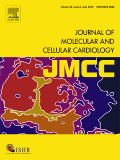
JOURNAL OF MOLECULAR AND CELLULAR CARDIOLOGY
Scope & Guideline
Leading the charge in molecular and cellular cardiology research.
Introduction
Aims and Scopes
- Molecular Mechanisms in Cardiac Function:
Research on the molecular pathways that regulate cardiac function, including signaling cascades, gene expression, and metabolic processes that influence heart health. - Cardiovascular Disease Mechanisms:
Studies exploring the pathophysiology of various cardiovascular diseases such as heart failure, arrhythmias, and cardiomyopathies, emphasizing the cellular and molecular alterations involved. - Innovative Therapeutic Strategies:
Development and evaluation of novel therapeutic approaches, including gene therapy, stem cell therapy, and pharmacological interventions aimed at repairing or regenerating cardiac tissue. - Cardiac Regeneration and Repair:
Research focused on the mechanisms underlying cardiac regeneration, including the role of stem cells, extracellular matrix, and signaling pathways in promoting tissue repair. - Sex Differences in Cardiovascular Health:
Investigation of how biological sex influences cardiovascular health, disease prevalence, and treatment response, with a focus on molecular and cellular differences. - Integrative Omics Approaches:
Utilization of multi-omics technologies (genomics, proteomics, metabolomics) to provide comprehensive insights into cardiovascular biology and disease mechanisms.
Trending and Emerging
- Cardiovascular Metabolism:
An increasing focus on the role of metabolic pathways in cardiac health and disease, particularly how metabolic dysregulation contributes to conditions such as obesity, diabetes, and heart failure. - Gene Editing and Gene Therapy:
A surge in research utilizing CRISPR and other gene editing technologies to explore genetic underpinnings of cardiovascular diseases and develop targeted gene therapies. - Extracellular Vesicles and Cell Communication:
Emerging studies investigating the role of extracellular vesicles in intercellular communication and their potential as biomarkers or therapeutic agents in cardiovascular diseases. - Inflammation and Immunology in Cardiology:
Growing interest in understanding the immune response in cardiovascular diseases, particularly how inflammation contributes to disease progression and the potential for immunomodulatory therapies. - Single-Cell and Multi-Omics Approaches:
The adoption of single-cell sequencing and integrative multi-omics approaches is on the rise, allowing for a more detailed understanding of cellular heterogeneity and the molecular landscape of cardiovascular diseases. - Personalized Medicine and Cardiovascular Health:
A trend towards personalized approaches to cardiovascular disease management, incorporating genetic, molecular, and clinical data to tailor treatments to individual patients.
Declining or Waning
- Traditional Pharmacology:
There is a noticeable reduction in studies centered on traditional pharmacological approaches to treating heart disease, as the field shifts towards more innovative and targeted therapeutic strategies. - Basic Animal Models:
Research using basic animal models without advanced genetic manipulations or disease modeling techniques has decreased, reflecting a broader trend towards more sophisticated and translational modeling approaches. - Cardiac Imaging Techniques:
While imaging remains a crucial tool in cardiology, there is less emphasis on traditional imaging studies (e.g., echocardiography) in favor of molecular and cellular investigations that provide deeper mechanistic insights. - Aging Research in Cardiovascular Disease:
Although aging is a critical factor in cardiovascular health, publications specifically addressing aging-related mechanisms in a standalone manner have diminished, likely due to a shift towards integrated approaches that consider aging as a variable within broader studies.
Similar Journals

Revista de la Federacion Argentina de Cardiologia
Uniting voices for a stronger cardiology community.Revista de la Federacion Argentina de Cardiologia is a vital publication in the field of Cardiology and Cardiovascular Medicine, providing a platform for researchers and healthcare professionals to share significant findings and innovative concepts since its inception in 2012. Published by the Federacion Argentina Cardiology, this journal specifically addresses contemporary issues and advancements within cardiology, contributing to the scholarly dialogue essential for improving cardiovascular health. Despite being categorized in the Q4 quartile for 2023 and presently ranking #358 out of 387 in its field, the journal remains committed to fostering academic inquiry and disseminating valuable research for both local and global audiences. Although it is not an open-access journal, it strives to balance accessibility with rigorous academic standards, ensuring quality contributions that are critical for practitioners and students alike. The journal’s ongoing evaluation and adaptation in the ever-evolving landscape of cardiology underscore its importance in advancing cardiovascular science and practice.

World Journal of Cardiology
Exploring the frontiers of cardiology and cardiovascular medicine.World Journal of Cardiology, published by BAISHIDENG PUBLISHING GROUP INC, stands out as a pivotal resource in the field of cardiology and cardiovascular medicine. With an ISSN of 1949-8462, this journal serves a global audience, promoting knowledge dissemination and collaboration among researchers, healthcare professionals, and students dedicated to advancing cardiovascular health. The journal demonstrates its credibility and impact in the field by achieving a respectable Q2 ranking in the 2023 category of Cardiology and Cardiovascular Medicine. Notably, it is listed in the Scopus database, ranking #189 out of 387 journals, placing it in the 51st percentile, which underscores its relevance and contribution to contemporary cardiovascular research. Although it operates under a subscription model, the journal provides diverse access options, ensuring that critical findings reach a wide audience. Through its comprehensive scope and commitment to publishing high-quality articles, the World Journal of Cardiology plays a vital role in shaping the future of cardiovascular science, making it an invaluable asset for those involved in this essential discipline.

Nepalese Heart Journal
Exploring Innovations in Heart Disease ManagementNepalese Heart Journal, published by the CARDIAC SOC NEPAL, serves as a premier platform for disseminating knowledge in the field of cardiology and cardiovascular health. With an ISSN of 2091-2978, this journal aims to bridge the gap between researchers, clinicians, and academicians by presenting high-quality, peer-reviewed articles that address clinical practices, innovative research, and emerging trends in heart disease management, especially within the context of Nepal and the surrounding region. Although it operates under a traditional publishing model, its commitment to excellence aids in reinforcing the scientific discourse in an area critical to public health. The journal is a valuable resource for professionals and students alike who are focused on advancing their understanding of cardiology and its implications for health policy and practice. Exploring the intersections of local challenges and global advancements in heart health, the Nepalese Heart Journal is poised to contribute meaningfully to the evolving landscape of cardiovascular research.

CELLULAR PHYSIOLOGY AND BIOCHEMISTRY
Showcasing Breakthroughs in Cellular PhysiologyCellular Physiology and Biochemistry is a premier Open Access journal published by the prestigious Cell Physiol Biochem Press GmbH & Co, dedicated to advancing research in the fields of physiology, biochemistry, and molecular biology. Since its inception in 1987 and transitioning to an Open Access model in 2013, the journal has established itself as a vital resource for the dissemination of high-quality research and reviews, showcasing innovative methodologies and groundbreaking findings in cellular processes. With an impressive ranking in the 2023 Scopus category as Q2 in Physiology and a robust percentile of 61, Cellular Physiology and Biochemistry is committed to fostering academic dialogue among researchers, professionals, and students alike. This journal not only provides unrestricted access to its articles, but also promotes the global sharing of knowledge, which is essential for the advancement of our understanding in these vital scientific areas. The journal's editorial team is dedicated to ensuring the highest standards of academic rigor and relevance, making it an indispensable addition to the libraries of those engaged in the life sciences.

DEVELOPMENTAL CELL
Pioneering Research in Cell and Developmental BiologyDEVELOPMENTAL CELL, published by CELL PRESS, stands as a premier journal in the fields of Biochemistry, Genetics and Molecular Biology, Cell Biology, and Developmental Biology. With a significant influence evidenced by its Q1 rankings across several categories in 2023 and a remarkable Scopus ranking placing it at the 98th percentile for Developmental Biology, this journal is pivotal for researchers and academics aiming to advance their understanding of cellular processes. Covering a broad range of topics from molecular mechanisms to cellular developmental pathways, DEVELOPMENTAL CELL publishes cutting-edge research articles that contribute to the dynamic landscape of cell biology and related disciplines. Although it does not currently offer open access, the journal is accessible through institutional subscriptions, reinforcing its commitment to disseminating high-quality scientific knowledge produced by leading experts in the field. Based in the United States, DEVELOPMENTAL CELL continues to push the boundaries of discovery and innovation in life sciences, making it an essential resource for professionals, researchers, and students alike in the quest for foundational biological insights.

CIRCULATION RESEARCH
Advancing cardiovascular science through innovative research.CIRCULATION RESEARCH is a premier journal dedicated to advancing the field of cardiovascular science, focusing on innovative research in cardiology and physiology. Published by Lippincott Williams & Wilkins, this esteemed journal has been a cornerstone of cardiovascular research since its inception in 1953, maintaining rigorous standards of scholarly excellence. With an impressive impact factor and ranking in the top quartiles for both Cardiology and Cardiovascular Medicine (Q1) and Physiology (Q1), it holds a significant position in the Scopus database. This journal features cutting-edge studies aimed at understanding the mechanisms of cardiovascular health and disease, promoting the translation of research into clinical practice. Weekly issues provide practitioners and researchers alike with vital insights to keep abreast of the latest developments. Although it does not offer open access, CIRCULATION RESEARCH remains vital for professionals striving to enhance their knowledge and impact in the ever-evolving landscape of cardiovascular medicine.

Nature Cardiovascular Research
Unveiling groundbreaking discoveries in cardiovascular sciences.Nature Cardiovascular Research, published by SpringerNature in Germany, stands as a premier journal dedicated to advancing the field of cardiovascular sciences. With an impressive 2023 categorization in the Q1 quartile across multiple disciplines—including Biochemistry, Genetics and Molecular Biology, Cardiology, and Medicine—this journal uniquely positions itself as a leading resource for pioneering research and innovative findings. Although currently not open access, it provides a rich repository of peer-reviewed articles that contribute directly to the evolving landscape of cardiovascular medicine. The journal aims to bridge the knowledge gap between basic science and clinical application, catering to researchers, healthcare professionals, and students alike who are immersed in the complexities of cardiovascular health. With robust Scopus rankings in key categories, Nature Cardiovascular Research is poised to shape future directions in the field, helping to foster a deeper understanding of cardiovascular diseases and their underlying mechanisms. Explore the latest research and be part of the conversation in one of the most impactful scientific domains.

npj Regenerative Medicine
Transforming Science into Healing Solutions.npj Regenerative Medicine, published by NATURE PORTFOLIO, is at the forefront of research and innovation in the field of regenerative medicine, fostering a deep understanding of cellular and molecular processes that can be leveraged for therapeutic advancements. Launched as an Open Access journal since 2016, it ensures wide dissemination of knowledge, allowing researchers, professionals, and students to access high-quality articles without barriers. With an impressive impact, it holds Q1 ratings across multiple categories including Biomedical Engineering, Cell Biology, Developmental Biology, and Medicine (miscellaneous) as of 2023, indicating its critical role in shaping contemporary scientific discourse. The journal ranks notably within the top 10% in multiple Scopus categories, indicating its commitment to publishing pioneering research that addresses pressing challenges in regenerative therapies. Addressing the dynamic convergence of disciplines, npj Regenerative Medicine is poised to not only impact academic thought but also translate into clinical applications, making it a pivotal resource for those invested in the future of medicine.

CANADIAN JOURNAL OF PHYSIOLOGY AND PHARMACOLOGY
Championing High-Quality Research Since 1964Canadian Journal of Physiology and Pharmacology, published by Canadian Science Publishing, is a leading peer-reviewed journal dedicated to advancing knowledge in the fields of physiology and pharmacology. With an ISSN of 0008-4212 and an E-ISSN of 1205-7541, this journal has been at the forefront of biomedical research since its inception in 1964. The journal operates within a constrained access model, ensuring a selective dissemination of high-quality research, while maintaining its esteemed position in the Q3 quartile across multiple relevant categories such as Medicine, Pharmacology, and Physiology as of 2023. Researchers, professionals, and students alike will find the journal a valuable resource for emerging trends and comprehensive studies that shape contemporary science, as evidenced by its competitive Scopus rankings. The Canadian Journal of Physiology and Pharmacology is vital for fostering scholarly dialogue and innovation in the scientific community, encouraging contributions that promote a deeper understanding of physiological and pharmacological phenomena.

CARDIOLOGY CLINICS
Transforming clinical practice with impactful cardiology research.CARDIOLOGY CLINICS is a prestigious journal published by W B SAUNDERS CO-ELSEVIER INC, offering insightful and comprehensive reviews in the field of cardiology and cardiovascular medicine since its inception in 1983. With its ISSN 0733-8651 and E-ISSN 1558-2264, the journal has established a significant impact factor within the academic community, holding a Q2 ranking in both Cardiology and Cardiovascular Medicine as well as in Medicine (miscellaneous) for 2023. Located in the heart of Philadelphia, USA, it serves as a vital resource for researchers, clinicians, and students seeking to deepen their understanding of cardiovascular diseases and advancements in treatment. Although it operates under a traditional subscription model, the journal remains committed to disseminating valuable knowledge that shapes current practices and informs future research directions. As it converges towards its 2024 issues, CARDIOLOGY CLINICS continues to play an influential role in enhancing the discourse on cardiovascular health worldwide, ensuring that its audience stays at the forefront of clinical and scientific developments.